Belgium - Australia on an BMW R1100 GS motorcycle, solo.
Report #23 - June 25th to July 11th, 1999...
Almost a fine...
The weather has been soso the last couple of days, but now it is a beautiful day. Not too warm, about 21 degrees Celsius - perfect for a long ride on the bike. My next stop is quite nearby: not 50 miles away. I have been invited (by email) by Richard Wolters, a Dutchman living in Australia and loving BMWs. I had my book ready when I spoke to him on the phone yesterday evening. I quickly made plans to visit the D'Aguillar and Blackall today. I can make it back in time tonight to visit Richard. From Surfers Paradise it is a 60 mile ride to the start of the spectacular trip. Around the time the GPS has reached the second mark I start reading the description in detail. Under the heading 'bookings and permits' I see I will cross the only forest in the neighborhood of Brisbane that allows motorized vehicles. But I have to have a permit, to be collected in person in Brisbane, now about 30 miles back...
It's clear I'm in the vicinity of a sizeable city; there is a lot more traffic , and the number of road signs is higher than ever. Sometimes they go a bit overboard: before an upcoming turn in a 50-mile road there is a sign: 'sharp curve, adviable speed 50 mph'. I know no one will see me once I'm on the gravel. That's how it has been until now, and I don't feel like going back to get a permit. I pause for a while at the sign that tries to stop me. I see an Ute and a motor crosser. The owner is resting, all sweaty, and drinking coffee out of a thermos. "Do you have a permit?", I ask him. "Yes, you are supposed to get a permit in Brisbane. But I never do that." The answer I expected. We speculate a bit about the chances of me being caught. I saw the park officer on my way over here (I thought it was an oncoming police car, and I braked sharply). The chance seems slim, the fine is about 150 dollar. I go for it.
The road is steep. Higher up the mountain the eucalyptus trees are dominating. Lower down the sheltered northern slopes the rain forest grows. Palm trees and ferns go hand in hand. I see ferns like we know them in Europe: low, trying to catch as much light as possible with their widespread leaves. There are a lot more species I haven't seen before, even some ferns resembling trees. They have a woody trunk about six feet high, with the leaves on top shaped like their lower-growing cousins. Between these ferns are palm trees, with leaves starting to grow low to the ground,m and falling off when the tree gets bigger. The similarities between the ferns and the palm trees are probably due to having mutual ancestors. After descending the mountain again I end up in a piece of rain forest - it isn't called 'rain' forest for nothing, everything is damp. The road is muddy, there are lots of small streams (which I cross without problems), and the air is filled with water vapor. The water almost seems trapped in the forest.
I've encountered two cars already. That's two more than I'm used to. And... after the next bend I almost run into a part officer in a 4WD with trailer. Astonished we have eye contact as he swerves to the left. He obviously hadn't expected me. Does this permit system enable him to get advised on who is in the forest this day? Anyway, he can't turn with that trailer. I don't slow down after our evasive manouvre, but I quickly vacate the scene.
Colleague overlander
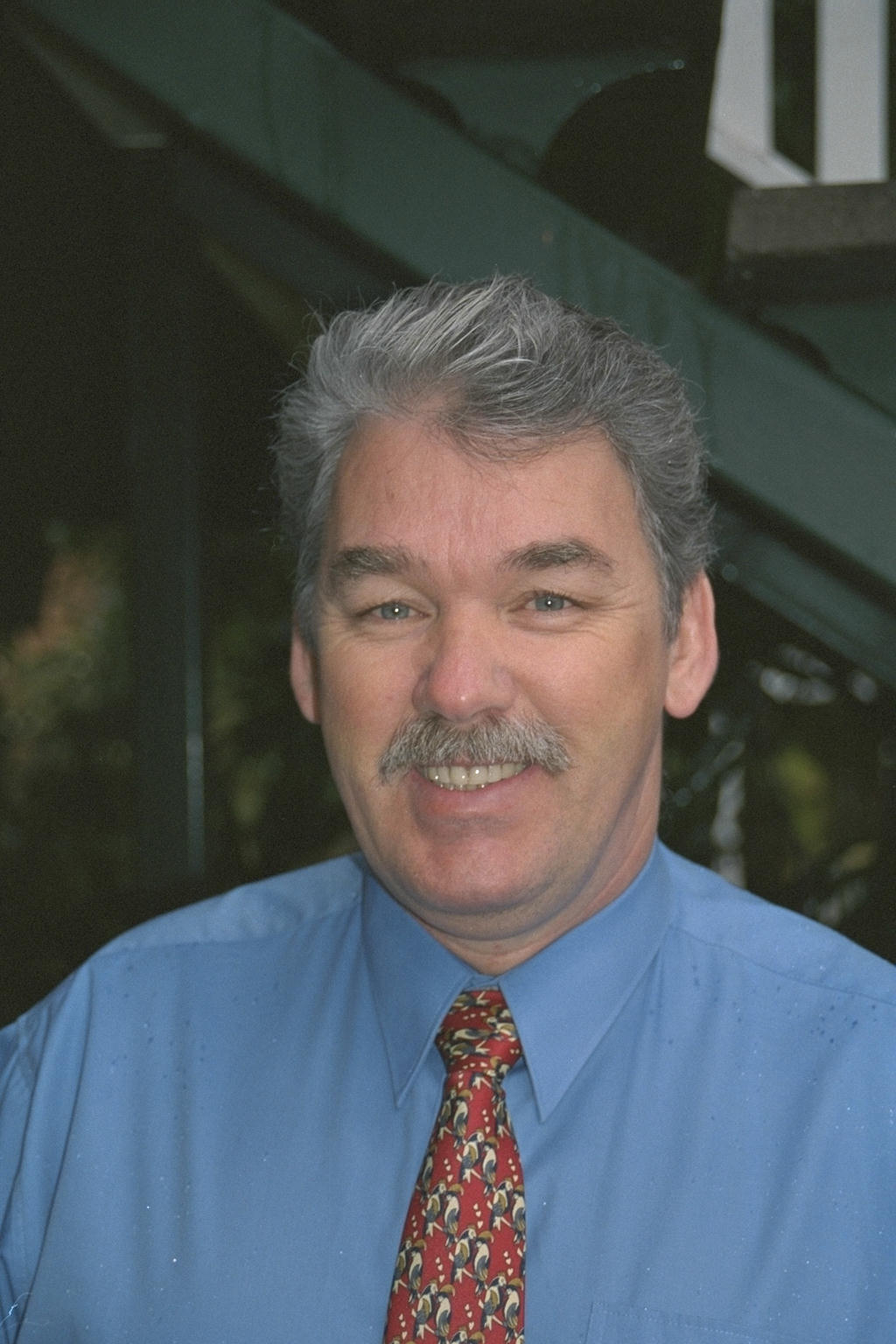
I don't know Richard Wolters. He repeatedly asked me over after getting my address from Daan van der Keur. Richard is a BMW freak, he is active on the 'Net with his home page, and he is an active member of a mailing list about BMW GS bikes. A year ago he made a trip with a couple of friends, from Brisbane via Madras, India to Amsterdam. All of them are members of Ulysses: 'Grow old disgracefully'. This is a fast-growing club of older bikers. One of them is over 60. He still hasn't returned from his trip, and has no plans to do so. He is now in Russia on his Harley Davidson. I once said to someone: "If I hadn't made this world trip being in my mid-thirties, I never would have made it." It's a load of crap - these guys have proven that once more.
After passing through the Blackall mountains I reach Beenleigh, the place where Richard lives. His girlfriend Kaye is not there this Friday evening, we treat ourselves to some pizza and beers. We spend this evening talking bike traveling. Finally some other stories, instead of trying to explain to someone how I wound up in Australia, and who doesn't know where Pakistan is situated. Richard has a commercial function, he appologizes for his suit and tie. Salesmen know the value of a good story, and Richard tells me one story after another.
That Saturday we spend on our bikes. It's a small trip, because we go for a walk amongst the tree tops in the rain forest. There is a system of hang bridges in place in the trees. The views are spectacular; we glance them over as we continue swapping stories. The weather forecast is bad: tonight it will start to rain, and this rain will last for five days. Sunday I stay, only to see the forecast was correct. But this day is great: together we surf the Internet, I take apart a scanner, and we solve a printer problem. This is the way a dreary Sunday afternoon can be fun, especially for someone who hasn't seen such a cozy home day in over a year.
On Monday it is still raining cats and dogs. Richard and Kaye offer me to stay a bit longer, but I want to go north. I'm starting to get fed up with this winter. Everyone visiting this part of Australia is going to Fraser Island. It is all made up of sand, and it is so special it has been put on the 'World Heritage' list of protected areas, just like the Kakadu national park and the Great Barrier Reef. I pass the island, it doesn't appeal to me in the rain. Totally soaked and cold I stop in Rockhampton - I have only seen asphalt and lots of water. I have cut the trip well short - tomorrow the remainder of the trip will take me over the mountains to the desert area in the rain shadow. Via a village called Dingo I get on gravel roads again. In the afternoon these unpaved and very steep roads lead me over the mountains back to the coast, it promptly starfts to rain again. The descend is a cross between riding my bike and balancing in the mud. The scenery makes up for all the misery though.
Mud
From Mackay the Eungella National Park is easily reachable, over asphalt. When I leave my motel room it is dry, and the guy at the reception says the shower in which I arrived yesterday evening was the first in weeks. I now read the entire trip description; of course I won't take the paved road to the park. My road takes me through the Mia Mia State Forest, it requires a permit. When it rains hard this road is closed down. At the 'Department for Primary Indiustries' in Mackay I get the free permit and an insurrance the four inches of rain will have cleared the road of all debris.
The first 30 miles are towards the inlands, here the mountains of the Great Dividing Range start. The strip of land between these mountains and the coast is cultivated: they grow sugar cones here. Miles and miles of this vegetation, they are just harvesting it. Just like in Thailand, when I passed these fields in January. I can hardly believe another half a year has passed already. They used old trucks in Thailand, here in Australia things go with an industrial efficiency. There are small railroad tracks along the fields, which fit small carts that can be placed on a special trailer as well, to be driven into the field. Huge machines mow the crop and spit it in the carts, chopped up in pieces. In long trains the carts are sent to the factories. The sweet smell of chopped and cooked sugar cones is everywhere.
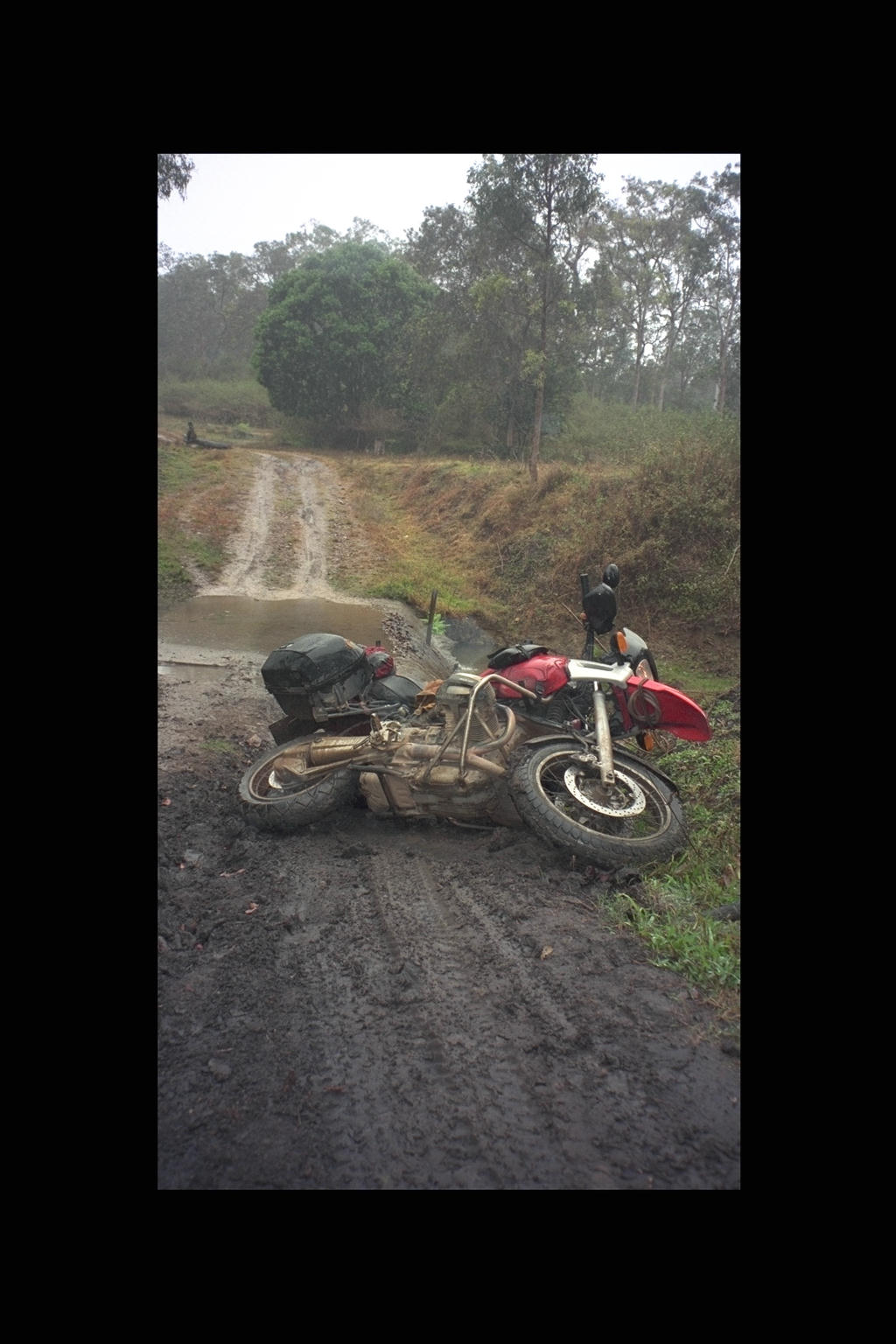
High pressure areas which develop in the center of Australia over the huge landmass finally drift off the continent, usually in south-east direction. These areas cause air flows from the sea. The moist air causes rain to fall, especially if this air has to rise over the mountains of the Dividing Range. That;s the reason this area is so densely grown - here all the rain falls. Behind the Range, in the rain shadowm it is dry - no rain forests, but trees capable of surviving for half a year without rain. And lots of grass, also adapted to these dry conditions. No crops, but steaks here. The vast grasslands are populated with cattle, living almost 'free', until they are rounded up to be transported to the slaughter house...
Eungella is still on the coast side of the mountains. I turn off the asphalt road, towards the rain forests. But: the closer I get to the mountains, the more clouds I see. It has rained her a lot more than at the coast - in the first three miles on the forest trail I fall down three times. After the third time I finally wake up to take a picture of the situation. If only the bike were on it's other side, so I could reach the film for the camera... Luckily I have my small camera always handy. I just crossed a stream, and judging by the amount of water I'm at the bottom of a valley. The climb out of the river bed is steep and slippery. I have never seen such greasy mud: it looks like clay glue. Of course the bike is in a ditch in the river, and my boots can't find a hold in the dirty mass. After 15 minutes of wrestling the bike has moved one and a half feet, and the front wheel is filled with mud. And the mud seems to dry up quickly; when I finally have the bike upright again the whell is blocked by some mud between the tire and the mud-guard. I drag the bike into the water to clean it up. There are five more rivers to cross, but not for me. I turn around.
Diving
Back in Mackay the weather is great. Using the highway I pass Prosperpine, and I take the road to Airlie Beach. From this coastal village you can reach the Whitsunday Islands, the Great Barrier Reef is somewhat further. I know this weather gives me no guarantees, but I put up my tent anyway. The next morning I wake up under a clear blue sky. I book a three day sail-dive trip aboard the 'Romance'. We will set sail this evening at 7 PM, to sail all night to the Reef.
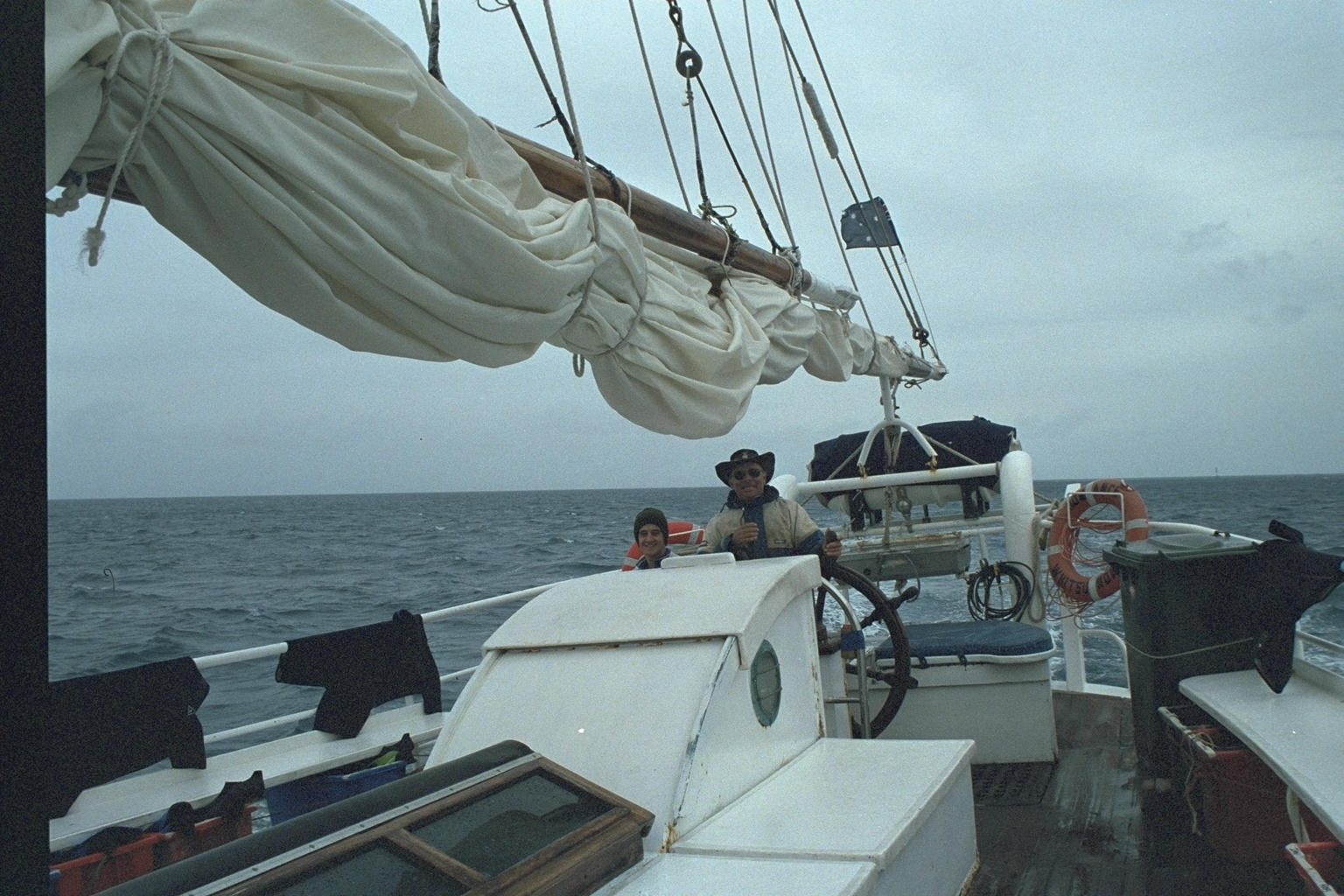
The Great Barrier Reef is quite a bit out into the open sea, or so this non-sailor calls it. From the harbor it is some 50 nautical miles (about 60 miles) to 'Knuckle Reef', the plave for our first dive. Directly off the coast the sea is about 200 feet deep; near the reef it gets so shallow the waves break. That's the only sign at the surface of this miracle. The sky has been clear all night, and a hard wind has blown. Almost all night we have sailed half wind, while I was on deck sleeping. That wasn't easy, waves six feet tall were hitting the bow of the ship diagonally, which made the ship 'rock and roll'. There aren't many things so enjoyable as lying on the deck of a ship and staring at the stars - the sleep deprivation is for later concern.
I will not complain about the diving equipment for long - no ruptured hoses like in Malaysia. The first impression after entering the water: "Brrrr - cold!". The tropical water is only 24 degrees Celsius. In the 30 degrees water of Malaysia and Thailand I wore a full suit, here I have a 'shortie': short sleeves and legs. The dives may only last 40 minutes (one of the many rules), but once below the surface I don't mind. I can't hold out much longer, it's too cold. I hope I will get used to the low winter temperatures in Belgium soon, I feel like a wimp sometimes. I consider 22 degrees Celsius and sunshine to be cold nowadays. That's about the maximum temperature where I live, in the summer!
Below the surface I find myself in the aquarium of a large zoo again. Strange how these memories of the first visit to the zoo linger. Artis (the zoo in Amsterdam) has modelled its basins to these seas, and not vice versa. But every time I have the same feeling of being in this unreal, unreachable world behind glass, the first minutes of each dive. "What is there to see?" Words fail to describe this. Imagine a slope with vegetation made of chalk in amazing colors like lime green, dark brown, soft purple, beige, blue and bright red. In between these corals there are anemones, sea-fans (big wavers catching drifting food), soft coral species (long, straight standing purple pipes) and microscopic stuff.
The clown fish enjoys the protection of the anemone, the coral forel hides under the coral constructions, the clams have wedged themselves in, and small black fish hide in one particular species of coral when I approach. Sergeant-majors (2 inches in size) bravely attack me when I get too close. A clam about one and a half feet in size closes its lids after I touch it, and a cuttle-fish has changed its body color five times already when I am still three feet away. Above me a couple of Barracudas with large mouths circle, the fastest fish in the sea.
I observe it all while being weightless. It is a great feeling floating around all relaxed, upside down sometimes. When I take a breath I rise a little, exhaling makes me go down a bit. The first years after each dive holiday I dreamt of this sensation - better than smoking marihuana in Pakistan (deliberately left out of my reports). We stay anchored at this beautiful place all day. With a small motor boat we are dropped off different points, and picked up after the dive. We go down four times, the last dive is in the dark. Several of us call it quits after three dives, they are too cold. I have dressed up warmly after the third dive, thinking I would pass up on the last dive as well. But after warmed up I decide to go anyway. It now is clouded, it's raining at the horizon.
This night we stay on this spot - many of us haven't slept at all last night. In the protection of the reef we sleep all night, but not on deck, it has started to rain. Because I call in last I get to sleep in front of the boat. Totally exhausted I fall asleep.
At 8 Am we are in the water again; after the following breakfast the captain informs us to fasten all loose stuff, the displacement to Hardy's Reef will go through a sea with waves of 10 feet. Why do I like to sleep on deck? You don't smell the vomit of your fellow passengers... Several of them dispose of their breakfast pancakes unwillimgly. It almost seems like the cook and the captain are scheming together...
This day we make four dives as well, and every time I dress up as warm as possible. This helps - I am not that cold as yesterday. Sunday morning we return in two steps. After the first dive I return to bed, only to get tossed out twice by the movements of the ship in the restless sea. The last dive is near the Whitsunday Islands. Here is a large bay, it provides shelter from storms. The sea bottom is more flat here, giving rise to gorgeous coral gardens. The last, shallow dive is the best of them all. I have a good impression of the Great Barrier Reef. Well, of this part anyway, because saying I've seen about 1,500 feet of the 1,300 miles of reef is stretching the truth already.
All those little rules
Everybody knows Australia once was a British colony. But I didn't know the Queen of England is still the ceremonial leader of the state nowadays. The Aussies call the Brits Pommies - a POM is a Prisoner Of her Majesty, a British prisoner. But not only the British exile system drew so many British people. In Katoomba I stayed in a motel run by two English owners. The couple lived there for the last 29 years, but they still call the island near the coast of Europe 'back home'. And in five years, when they will enjoy their earned pension, they will do that in the United Kingdom.
They speak English, but with a thick accent. I have to get used to that. The organisation of this country resembles that of the US. Lots of hotels, fast food places, small shops and even video rental shops are American based. The first impression makes one suspect the Aussies are much more like Americans than like the stiffer British people, with their jolly "G'day, mate!". They do look like the British in their insistent meddling in other affairs. This is probably because of the small, isolated communities, they are a lot like small farmer villages. There is a slightly more cosmopolitan air to Sydney and Melbourne, but outside these cities everything seems to be geared towards organising things that hardly seem worth the bother. Like the sign on the restroom stating your 5 year old can only use it under parental guidance. Or the beaten-up chair in the corner with a sign "customer waiting area". Or a request to turn off your cell phone when entering the bakery, it could upset the cash register.
And those are just the initiatives of the people themselves. The government is just as bad in making up rules which make you wonder whether following them is possible or sensible. I've spoken to someone who got a ticket for parking his car the wrong way around (just like JC in 1994). Why do all the cars have to point in the same direction? The police officer couldn't tell me... It is natural to drive more carefully when you are near a school bus stop. They have signs here limiting the maximum speed to 25 mph between 8:30 and 9:00, and between 15:30 and 17:00. It's a very large sign, having all these times on it. I had hoped othese times would be the same in all cases, but every village seems to have their own times. I saw one in a 60 mph road, right in front of the bus stop. The sign 'end 25 mph zone' was only 150 feet further down the road. It all reminds me at the strange British political solutions, they are acceptable, but they loose sight of the reality.
What bothers me the most is the not-my-business mentality. They say diving is dangerous. Every time I want to make a dive I have to sign papers so my family won't press charges against the dive club. That's accepted everywhere, but it's not enough for the Australians. Here I have to sign for the dive depths I have witnessed for my diving buddy. And at the end of each day I have to sign for the correctness of my diving profiles which are recorded by the dive master. If something should happen to me, it will be difficult to claim the diving school could have made an error.
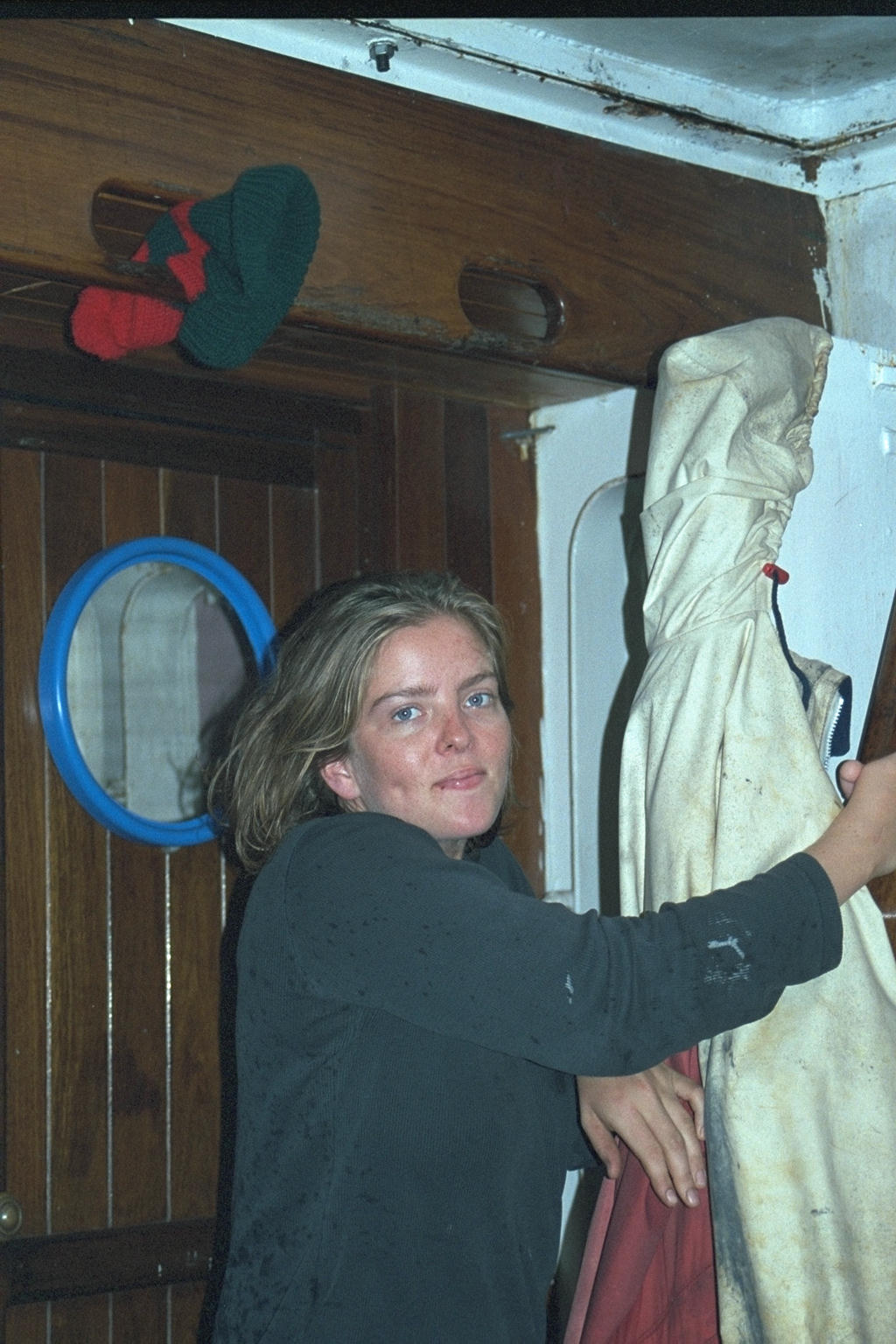
Of course there are two sides to this not-my-business policy: Carrie, from the UK, explained me her perspective on these matters after a heated discussion following the end of the dive trip. Carrie suspects the government regularly checks the dive schools. Because of this she can now choose any school she likes, confident that it has qualified staff and quality materials. "And if you should die, you would want to have someone investigate the cause", she poses. Apart from the fact that I couldn't care less if I'm already dead, I can imagine that the people left behind would be interested in knowing whether I died during diving, or during a bike trip. But to know whether the brakes failed, or if I was foolish enough to go down with a faulty breathing aparatus, seems less important to me. That knowledge won;t make me live again. Carrie insist on a thorough (3 and more months) research. We disagree.
When you are hit by a car after stumbling out of a pub completely drunk, the barkeeper could be held responsible. In Surfers Paradise the guilt was for 40 percent on the barkeeper's side, and 30 percent on the drinker's side. Every bar has a (mandatory) sign they are not allowed to serve booze to drunken people. But what the definition of 'drunken' is, is not known. One has to wait for the court case to settle this. You can only sell alcohol when licensed. These licenses are not easy to obtain, and they are very expensive. In the state of Queensland only hotels can sell you alcohol - the drive-in bottle shops next to the hotels (where you can fill the trunk of your car discretely) don't know a thing about the taste of the wine they sell, they know everything about the legal questions involved.
When I want to extend my visum, I want to know what the sanctions are. That's how I am - I want to know what will be the 'punishment' if I do something. The lady jumps up as if stung by a wasp, and fetches a colleague. "This gentleman wants to break the Australian law", she says when the witness is present. I hastily rephrase my question more politically correct: "What would be the sanction in the hypothetical case that a foreign visitor from Europe stays longer than his visum permits him?" It all sounds very forced. (I can count on a stay in prison until my deportation, which I have to pay myself: 95 dollar per day. Of course I have to pay for the fare to Europe as well.) Forced - that's exactly the right word for the little rules in this country.
Now we go mining uranium in the middle of Kakadu Park. Because it is profitable, of course. But nobody says it out loud - the question was whether the UNESCO in Geneve wanted to place the park on the list of the endangered World Heritage parks. UNESCO didn't do that, and now mining is approved. They let the country be run (partly) by a club in Geneve because they lack the political guts. At the same time the Americans are bad, the Pommies are no good either, and they don't know much about the rest of the world. No, I don't care much for the mentality of these British descendants.
Fellow victims
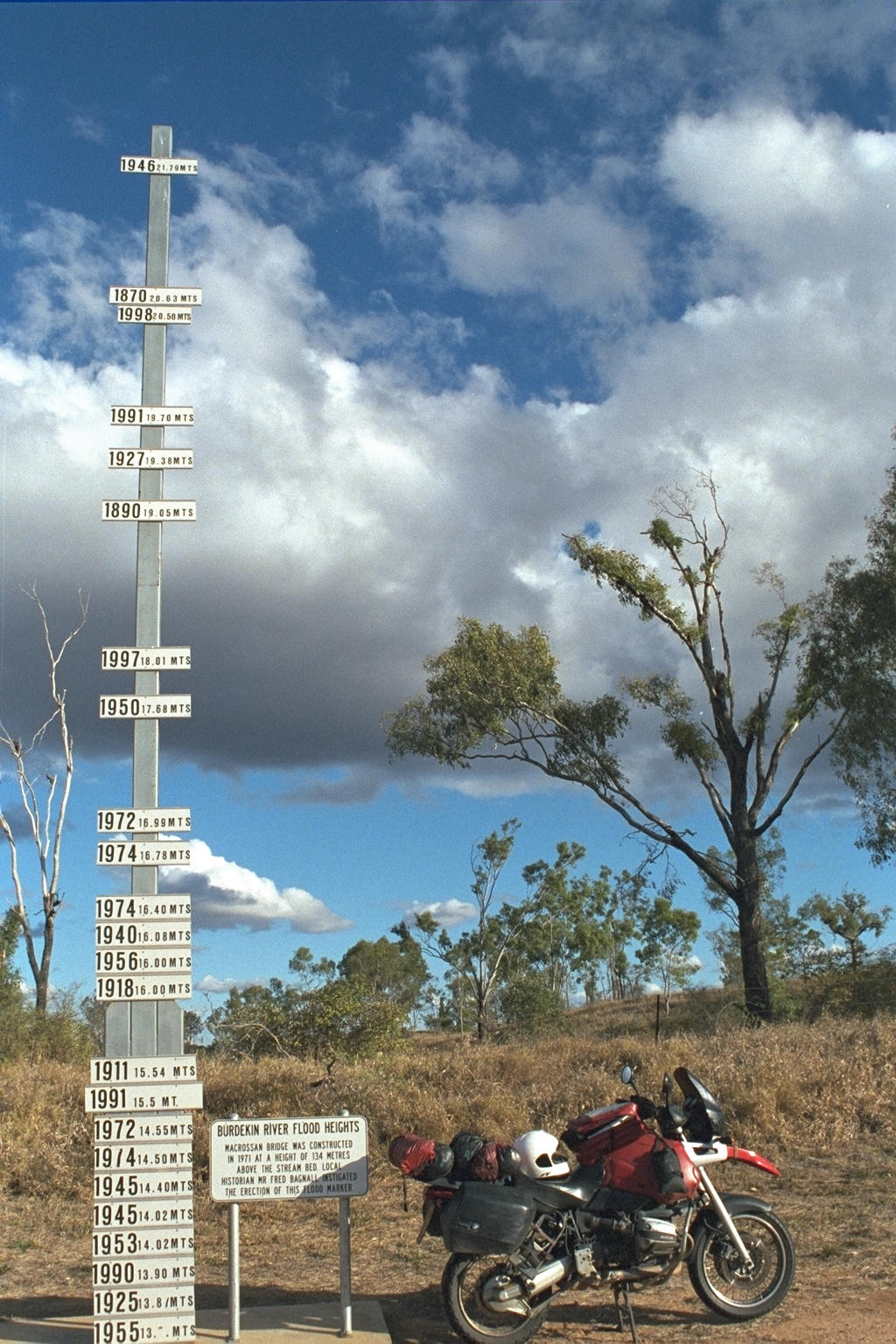
From the coast I ride via Ayr to Charters Towers, crossing the Range again. Gravel roads are my favourite way of crossing these mountains. From Charters Towers I go to Porcupine Gorge National Park, and I visit a canyon several million years old. The river responsible for this work barely has water in the dry season. No wonder cutting through the rocks took so long: it is a part-time job!
The scenery consists of bone dry grasslands. I encounter gates placed across the road to keep the cattle off the neighbor's property. Actually I'm crossing fields now. There are no fences along the road; you just have to watch out for the walking cattle. The fields are mostly limited by cattle grids, they are several tens of miles apart. On the 130 mile long sand path from the park to the asphalt road near The Lynd I only see a gandfull of farms. They are called 'stations' here.
Just before I turned towards the Porcupine Gorge I had my lunch in Prairie. The name of this village is inspired by the scenery: it's the landscape we all know of those cowboy movies. The village is very small, and harbors a gas station, a postal office, a small supermarket (all in one building), a police station and the hotel/restaurant which I'm visiting. There are thirty residents, the lady owner of this place tells me, while telling me the rest of her life. The reason for all these facilities quickly becomes clear: all 'stations' in the neighborhood depend on them. Yesterday they had a family here, on their way back from a shopping visit in the big city - an adventure for the whole family, concluded with a joyful dinner in Prairie, only three hours of gravel from home...
From The Lynd I go back to the coast, and of course it rains. I'll never go back here in the winter. I pass Ingham, and I try to call Carolyn, she has stopped answering my email. There is probably something wrong with her computer. Just south of Tully I run into Harmen and Nathalie!
They are en route to Sydney. Their trip is over July 20th; Australia has brought them a fair amount of misfortune, and has cost them a lot of money. The purchase of the Suzuki for Nathalie was a mistake: Harmen had to perform an engine revision. It was expensive, and moments after it was finished Nathalie had an accident. Her knee was badly swollen, but it's OK now. They had to go to a hospital, fortunately no permanent damage. The accident and the cold in Alice Springs have made them decide to return home. They want to sell the Suzuki tomorrow, so they only have to ship back one bike. They will have been on the road exactly one year when they return.
Harmen and Nathalie have met another Dutch couple: Ronald and Martine. I visit them that evening in Cairns. Ronald works in computers as well, he is a COBOL programmer. Martine is a medical secretary. Like Nathalie she has been on the back of the Africa Twin all trip long. I admire that. We spend the evening and part of next day together.
Erik Monninkhof, visiting Australia with his family, has brought along new brake disks. The special bolts posed a problem - the BMW dealer in Cairns cannot help me either. When I meet Erik, one of these days, I'll think of something.
In the mean time I know Carolyn's computer works fine, there is something else going on in California. She doesn't think it is a good idea for me to come to the States right after my trip; she is vague about her reasons. I get the impression the end of the world trip and our relation will coincide...
Termites
If there is a 4WD Mekka in the world, it has to be on the outermost tip of Cape York (the 'point' on the righthand side of the continent). Various sources tell me the roads are very bad this year. One of them even talks about closed roads. Furthermore gas is hard to get; if I am to travel to this place I have to take some jerrycans on the back of my overweight bike. I decide to leave it be, but I want to go to Cooktown.
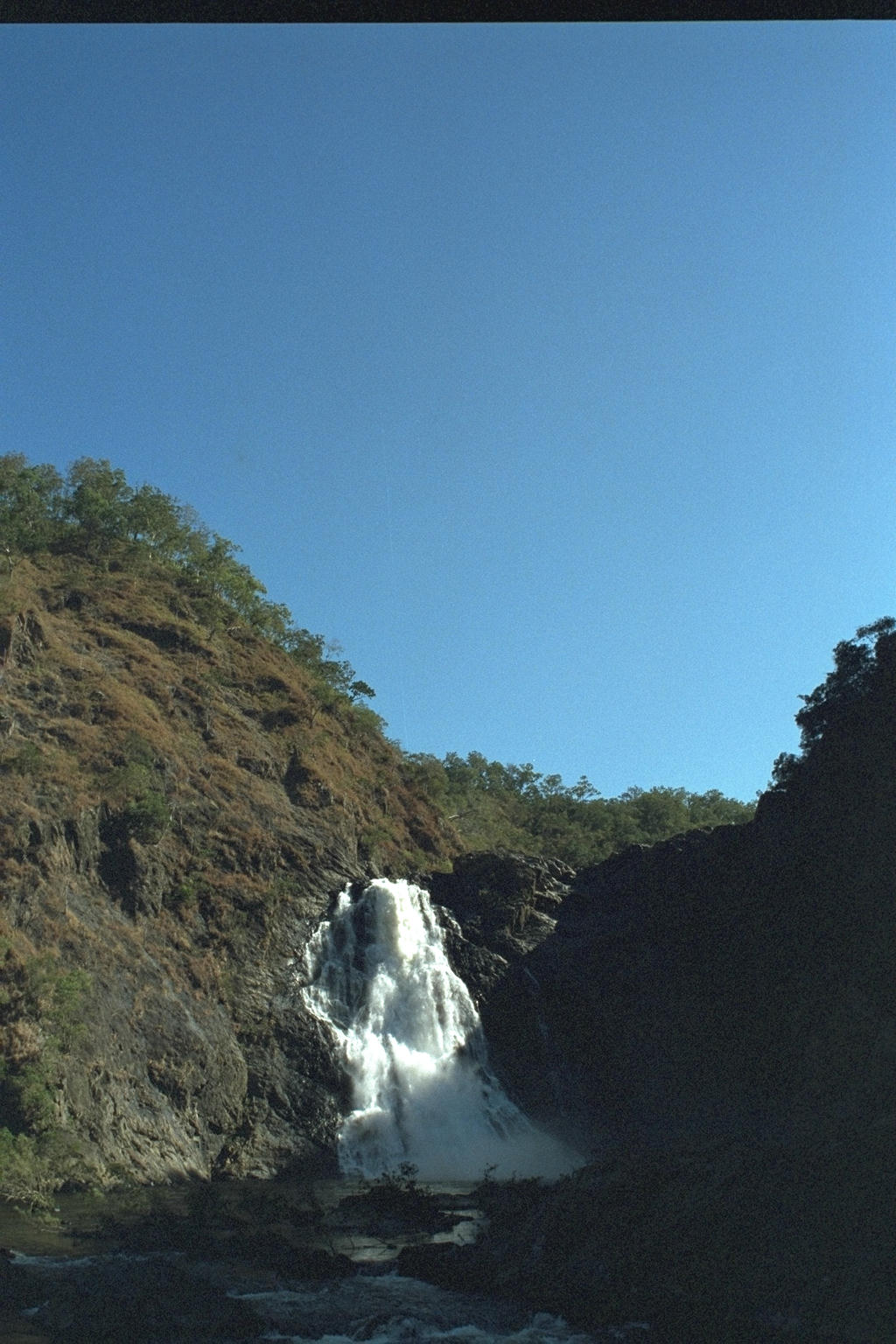
The strip of land between the Dividing Range and the sea gets narrow north of Cairns. There is a gravel road along the sea, through the mountains. This is a gorgeous road: very bumpy, very twisty, straight through the rain forest. Because of the rain in the past weeks the streams are filled. I make my deepest crossing ever: I'm amazed the engine keeps running with the spark plugs well under water. I'm soaked as well, I have crossed the river without the bike first. The next river is crossed without a checkout first, and because of that the bike almost falls over (it would have surely gone under water with its air inlet). A beautiful road, leading to a gorgeous waterfall.
I put up my tent amidst a few 'real' Australians. The people traveling to 'Mekka' through the sand in a car with a month's worth of food reserves is a different type all together when compared with the nervous immigration officer. I don't notice a thing at night, but when I pack my things in the morning I see I have been too close to a termite nest. The busy little insects have drilled a lot of holes in my tent, and have started carrying in building materials for a termite hill. When I want to vacate them they get aggressive as well! But finally I squash the last of them, and I pack in my tent. Oh well, nice, those rain forests.
The next morning I ride through Cooktown back to Port Douglas, near Cairns. I'll tell you what I'll do there next time...